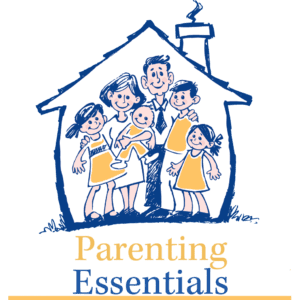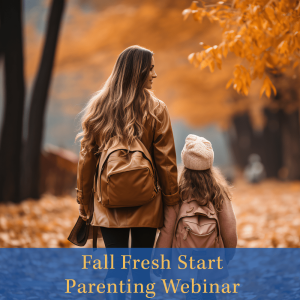No More Standing on the Parenting Sidelines
by Nicholeen Peck
Children sometimes say, “I wish my parents would stop getting involved in my life.” But is that what they really want? This idea of having total freedom without any oversight, teaching, or correction sounds very attractive to a child . However, when a person looks at the long-term effects on children who are raised by parents who simply watch them live their lives, never setting up boundaries, or talking about important topics with them, essentially, taking a hands off approach to parenting; these same children often wish that their parents would have stopped them from making bad choices, and took time to communicate with them when they needed to stop doing something wrong.
Years ago, a woman at a parenting training where I was teaching said to the class, “When I was young, I did everything bad that I could think of to get my parent’s attention just to see if they really cared. My mom never stopped me. She just didn’t care. She said, ‘She wanted to be my friend.’ So, she allowed me to ruin my life. I’ve now spent most of my adult life trying to heal from that neglectful parenting and my negative attention seeking.”
When I heard this story my heart broke. I wondered, “Do parents know how badly children want them to step in and guide them? Why do parents continue to stand on the sidelines of their children’s lives when so many adults have stories like this? What are parents afraid of? What are they hoping will happen?”
Stepping Back
Why do parents step back from parenting? Of course, the reasons may vary from family to family. However, over the years the following reasons have become common responses when I’ve talked with parents. The top answer is, “I want my child to like me.”
Additional answers include:
“I don’t want negative interactions with my child.”
“I love them too much to fight.”
“My parents were heavy handed with me, and I didn’t like it.”
“I’m afraid of what I might do to my child since I’m not very calm.”
“Disengaging from interactions allows me to have more peace.”
“It takes too much of my time.”
“I want to spend my time with my children doing something besides correcting behaviors.”
“I don’t know what I’m doing.”
“What if I do it wrong, and they end up hating me?”
Roles
The role of a parent is vastly different from the role of a friend. Friends don’t often tell each other what chores to do, they don’t establish standards to follow, or correct each other for mistakes. Traditionally, parents knew that there was a difference between these two roles. Then, Dr. Benjamin Spock, popularized the theory that parenthood would be less painful if parents thought of themselves as friends instead of parents. Looking back, historically, we can see that this movement dismantled the family dynamic and led to mass social and familial dysfunction. If family roles are disregarded, then proper teaching and guiding are neglected during the time youth are growing up, leading to confusion, doubt, fear, and anxiety for these future adults.
Roles and responsibilities are different things. A role is a self-evident truth about who a person is. Parents are teachers. Even if they don’t deliberately teach, parents still teach their children. Children are learners. Even if they don’t want to learn, children still learn from their parents and other sources.
Intentional Parenting
Children need parents more than they need friends. Parents are to help provide for their children’s needs and nurture their children as they grow and develop into adults. Most parents understand their role in providing the undeniable physical needs of their children. Yet there are psychological, social, spiritual, and intellectual needs that parents fulfill for their children which only happens when there is good parent/child bonding. Since parent interactions are so vital for the whole child, it would be wise for parents to take parenting seriously and intentionally.
Intentional parents see themselves drastically different from the way sideline parents see themselves. The following are characteristics of intentional parents.
Intentional parents:
- Recognize that parenting can be uncomfortable and draining sometimes.
- Understand that teaching and nurturing the child is a top priority.
- Want more healthy interactions with their children to help the child mature and progress.
- Consider teaching and correcting children as an irreplaceable part of their parental role and vital
for child development. (They embrace their role.) - Feel empowered by a sense of duty.
- Choose to be fueled by creating family connections.
- Recognize and honor familial roles for maximum family function and peace.
- Know that parenting is difficult but worth all the effort if it benefits the child.
- Plan ahead for good teaching and calm corrections. (They make a plan to have healthy interactions.)
Children don’t accidentally develop good character. They don’t become charitable and kind by some magic wish. Principles and truths are taught by example and training, so children learn these character traits by the example and training of their parents.
Becoming Intentional
It can be difficult to change parenting habits and overcome setbacks from our upbringing. I see parents all over the world, from various countries and a variety of belief systems choose to deliberately become intentional in their parenting. One of the biggest challenges that parents making this change ‘call themselves out’ on is their lack of consistency. When a parent says to me, “I struggle with consistency.” Then I know that they are hoping to figure out how to be more intentional in their parenting. This self-analysis brings joy to my heart. It’s a comment of hope and searching, and I know that they are on their way to making the change to becoming intentional parents.
Consistency
Self-analysis is the start of making a change. Years ago, I wanted to create a better habit of studying my scriptures daily because I wasn’t very consistent with my study. I knew that the years of hoping for scripture study consistency didn’t help me become consistent. Finally, I chose to make a deliberate plan that included a daily deadline and consequence. The daily deadline was bedtime, and the consequence was having to stay up later. I told myself that I would not allow myself to go to bed unless I had prayed and read my scriptures. I instructed myself that I would not get off the floor of my room until I had read the scriptures. (I pray on my knees and that puts me on the floor.) Since I couldn’t get off the floor until I read the scriptures, I couldn’t get into that bed until after scripture time. There were a few times I got into bed before reading scriptures and then I realized my mistake as I went through my mental nightly checklist. So, I made myself get up and get back on the floor to read. This nightly habit led to a love of scripture study that has blessed my life. Now I read in the morning, but I still find myself asking each night, “Did I read my scriptures yet?”
If you want to become more consistent in your parenting, you might need to habit-train yourself just like I did with my scripture study example.
Start Here
A good place to start becoming intentional as a parent is by looking for ways to praise your child. This will teach you to look more closely and will change the tone of the interactions in the home. Next, teach your children the Four Basic Skills of self-government and how you will correct them if they don’t use their skills. (Sometimes we need a script and skills to help us break old habits.) This intentional skills teaching will hold you accountable for corrections and decrease emotional responses due to predictability. Remember to increase your praise with your children for doing well at using their skills when they use them. Then, schedule a nightly check-in with yourself to see how your interactions are going. Use a family meeting as a weekly check-in for the whole family too. Having regular family talk times and problem-solving times keeps everyone united and working together. Finally, to really be consistent with your teaching and corrections, use the same predictable, non-emotional but instructive words each time.
People sometimes think that if they aren’t consistent or predictable to begin with that they can’t change. Not true. We all can change. It’s a choice to develop new habits and let go of old ones. It may take work, but it’s still just a choice. The truth about intentional parenting is that if you change your intention, then you can be intentional too.
At a ball game, the fans on the sidelines don’t score points. Only the players do that. It’s time to stop standing on the parenting sidelines. Our children need us, and even want us, to be part of their growth and development. Parents are meant to have that influence. After all, it’s our role.
Learn more skills for intentional parenting here .
Index
- Adults, Analyzing, Assertive Communication, Begging, Boundaries, Calm, Changing Hearts, Character Building, Control, Correcting, Couple Relationship, Culture, Entitlement, Expectations, Family Culture, Manipulation, Mutual Respect, Power Struggling, Privileges, Religious Troubles, Respect, Rewards, Roles, Seek to Understand, Skills, Social Skills, Spouse, Unity, Vision, Work Ethic





